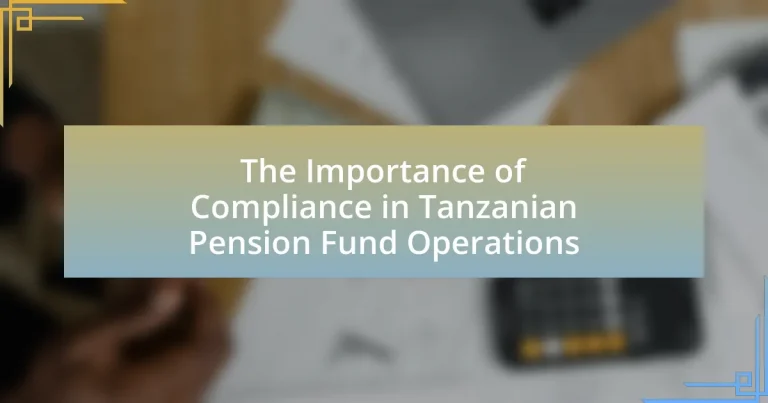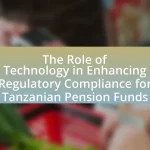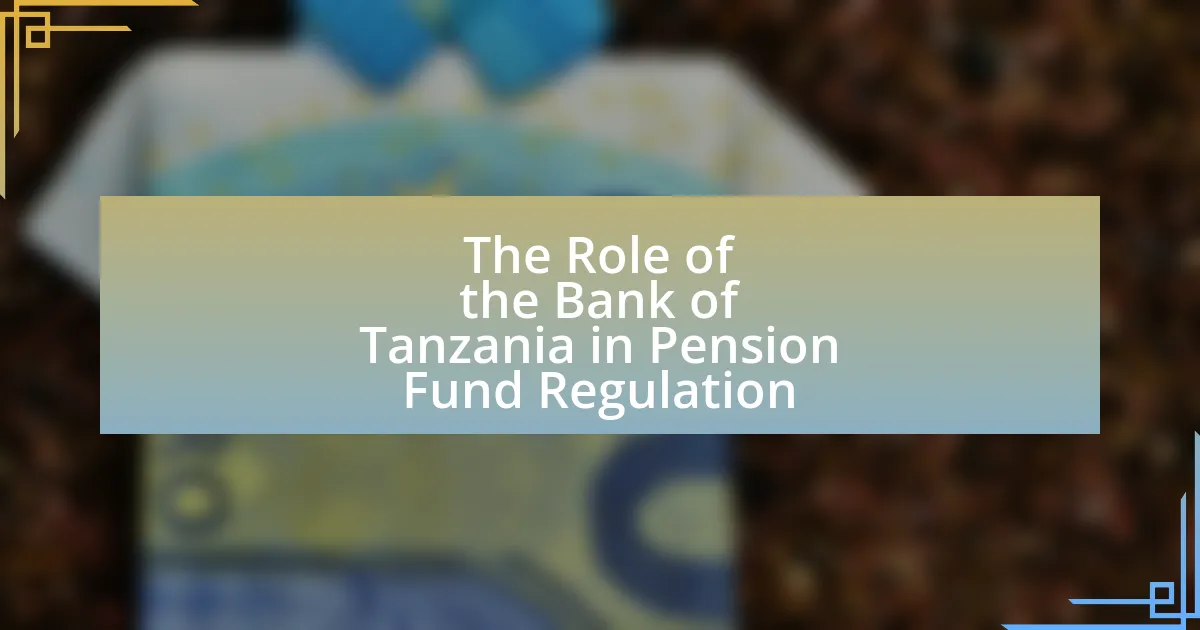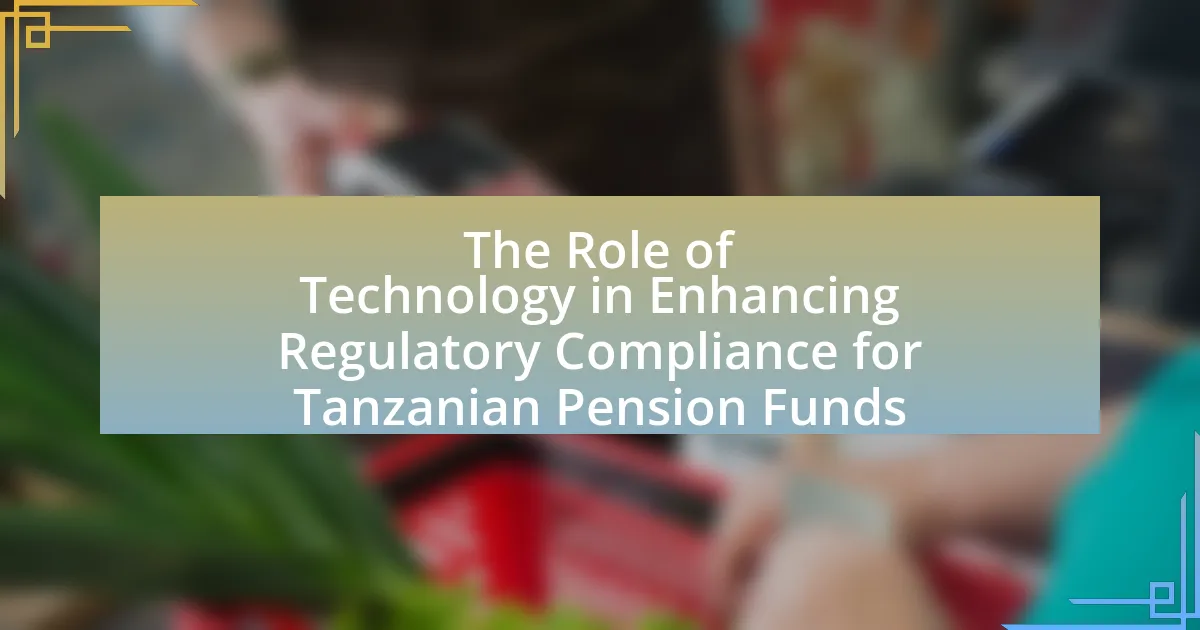The article focuses on the significance of compliance in Tanzanian pension fund operations, emphasizing its role in adhering to regulatory frameworks that protect beneficiaries and maintain financial integrity. It outlines key compliance regulations, including the Pension Act of 2008, and discusses how compliance impacts the functioning and sustainability of pension funds. The article also addresses challenges faced in ensuring compliance, such as resource limitations and regulatory complexity, while highlighting the importance of staff training and technology in enhancing compliance efforts. Additionally, it presents best practices and practical steps for pension funds to strengthen their compliance frameworks, ensuring accountability and transparency in fund management.
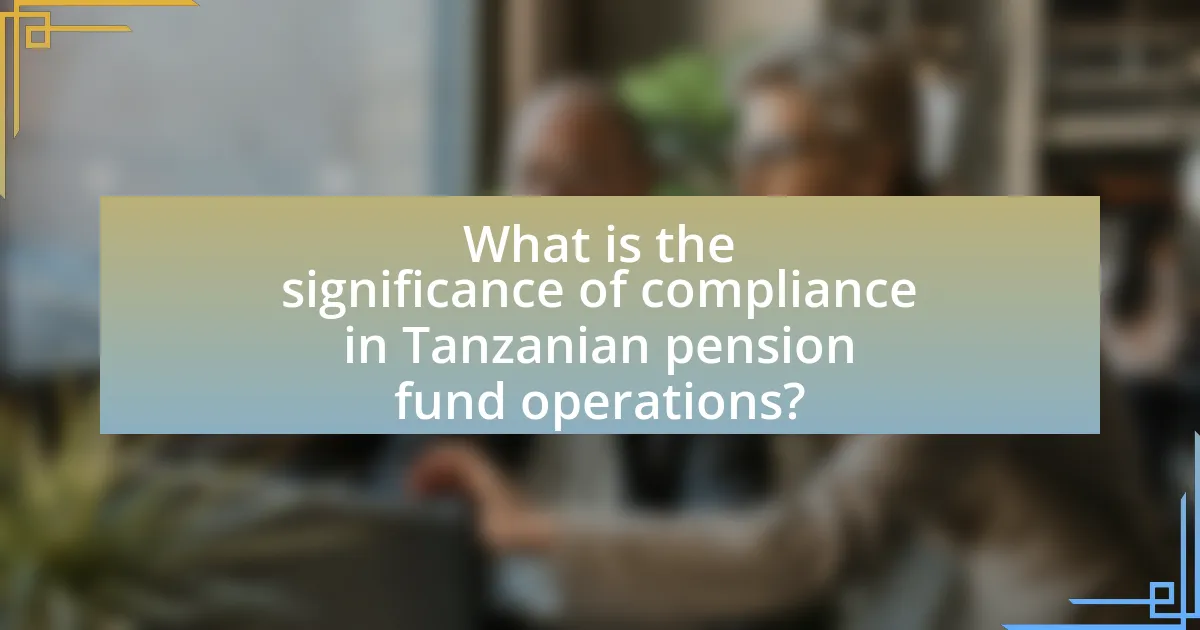
What is the significance of compliance in Tanzanian pension fund operations?
Compliance is crucial in Tanzanian pension fund operations as it ensures adherence to regulatory frameworks, safeguarding the interests of beneficiaries and maintaining the integrity of the financial system. By following established laws and guidelines, pension funds can mitigate risks associated with mismanagement and fraud, thereby enhancing trust among stakeholders. For instance, the Pension Act of 2008 mandates that pension funds operate transparently and prudently, which helps protect members’ contributions and ensures that funds are available for retirement payouts. This regulatory compliance not only fosters financial stability but also promotes confidence in the pension system, encouraging more individuals to participate in retirement savings.
How does compliance impact the overall functioning of pension funds in Tanzania?
Compliance significantly enhances the overall functioning of pension funds in Tanzania by ensuring adherence to regulatory frameworks and promoting transparency. This adherence fosters trust among stakeholders, including beneficiaries and investors, which is crucial for the sustainability of pension funds. For instance, the Pension Funds Act of 2008 mandates strict reporting and governance standards, which help mitigate risks associated with mismanagement and fraud. Consequently, compliance not only safeguards the assets of pension funds but also contributes to their long-term viability and effectiveness in providing retirement benefits to members.
What are the key compliance regulations governing Tanzanian pension funds?
The key compliance regulations governing Tanzanian pension funds include the Pension Act of 2008, which establishes the legal framework for pension schemes, and the regulations issued by the Pension Fund Regulatory Authority (PFRA). The Pension Act mandates that pension funds must be registered with the PFRA, ensuring adherence to investment guidelines and reporting requirements. Additionally, the regulations stipulate minimum funding levels, governance standards, and the protection of members’ rights. These regulations are crucial for maintaining the integrity and sustainability of pension funds in Tanzania, as they promote transparency and accountability in fund management.
How do compliance requirements differ among various pension fund types in Tanzania?
Compliance requirements in Tanzania differ significantly among various pension fund types, including public sector funds, private sector funds, and occupational pension schemes. Public sector pension funds are governed by specific regulations under the Public Service Pensions Act, which mandates strict adherence to government policies and financial reporting standards. In contrast, private sector pension funds operate under the Pension Act, which allows for more flexibility but still requires compliance with minimum funding standards and investment regulations. Occupational pension schemes, often established by employers, must comply with both the Pension Act and additional guidelines set by the Social Security Regulatory Authority, focusing on member protection and fund management practices. These distinctions ensure that each fund type adheres to tailored compliance frameworks that reflect their operational contexts and stakeholder needs.
Why is compliance crucial for the sustainability of pension funds?
Compliance is crucial for the sustainability of pension funds because it ensures adherence to regulatory frameworks, which protects the interests of beneficiaries and maintains financial stability. Regulatory compliance mitigates risks associated with mismanagement and fraud, thereby fostering trust among stakeholders. For instance, in Tanzania, the Pension Act mandates specific investment guidelines that pension funds must follow to safeguard assets and ensure long-term viability. Non-compliance can lead to penalties, loss of licenses, and ultimately jeopardize the fund’s ability to meet its obligations to retirees.
What risks are associated with non-compliance in pension fund operations?
Non-compliance in pension fund operations poses significant risks, including financial penalties, legal repercussions, and reputational damage. Financial penalties can arise from regulatory bodies imposing fines for failing to adhere to established laws and guidelines, which can severely impact the fund’s financial health. Legal repercussions may include lawsuits from beneficiaries or stakeholders, leading to costly litigation and potential settlements. Reputational damage can result in a loss of trust among participants and the public, which may deter future investments and participation in the pension scheme. According to the Financial Sector Deepening Trust in Tanzania, non-compliance can also lead to increased scrutiny from regulators, further complicating operational processes and increasing costs.
How does compliance enhance trust among stakeholders in pension funds?
Compliance enhances trust among stakeholders in pension funds by ensuring adherence to regulatory standards and ethical practices. When pension funds comply with laws and regulations, they demonstrate accountability and transparency, which are critical for building stakeholder confidence. For instance, compliance with the Pension Act in Tanzania mandates regular audits and reporting, which allows stakeholders to verify the fund’s financial health and operational integrity. This transparency reduces the risk of mismanagement and fraud, fostering a sense of security among investors, beneficiaries, and regulators. Consequently, stakeholders are more likely to engage positively with compliant pension funds, knowing their interests are protected and that the funds are managed responsibly.

What are the challenges faced in ensuring compliance in Tanzanian pension funds?
The challenges faced in ensuring compliance in Tanzanian pension funds include inadequate regulatory frameworks, lack of transparency, and insufficient capacity for enforcement. The regulatory environment often lacks clarity, making it difficult for pension fund managers to adhere to compliance requirements. Additionally, many pension funds struggle with transparency issues, which can lead to mismanagement of funds and a lack of trust among stakeholders. Furthermore, the regulatory bodies may not have the necessary resources or expertise to effectively monitor and enforce compliance, resulting in gaps that can be exploited. These factors collectively hinder the effective operation of pension funds in Tanzania, impacting their ability to protect beneficiaries’ interests.
What common obstacles hinder compliance efforts in pension fund operations?
Common obstacles that hinder compliance efforts in pension fund operations include regulatory complexity, lack of resources, and inadequate training. Regulatory complexity arises from the numerous and often changing laws governing pension funds, making it difficult for organizations to stay compliant. A lack of resources, including financial and human capital, limits the ability of pension funds to implement effective compliance programs. Additionally, inadequate training for staff on compliance requirements can lead to unintentional violations, further complicating adherence to regulations. These factors collectively contribute to challenges in maintaining compliance within pension fund operations.
How do resource limitations affect compliance in pension funds?
Resource limitations significantly hinder compliance in pension funds by restricting their ability to meet regulatory requirements and implement necessary governance practices. Limited financial resources can lead to inadequate staffing, insufficient training, and a lack of technological tools, which are essential for maintaining compliance with laws and regulations. For instance, a study by the International Labour Organization in 2020 highlighted that pension funds with fewer resources often struggle to conduct regular audits and risk assessments, increasing the likelihood of non-compliance. This non-compliance can result in legal penalties and loss of trust from stakeholders, ultimately jeopardizing the fund’s sustainability and effectiveness in providing retirement benefits.
What role does staff training play in overcoming compliance challenges?
Staff training plays a critical role in overcoming compliance challenges by equipping employees with the necessary knowledge and skills to adhere to regulatory requirements. Effective training programs ensure that staff understand the specific compliance obligations relevant to Tanzanian pension fund operations, such as the Pension Act and guidelines from the National Social Security Fund. Research indicates that organizations with comprehensive compliance training experience a 50% reduction in compliance violations, highlighting the direct impact of training on compliance outcomes. By fostering a culture of compliance through ongoing education, organizations can mitigate risks associated with non-compliance, thereby enhancing operational integrity and protecting stakeholder interests.
How can technology aid in improving compliance in pension funds?
Technology can significantly improve compliance in pension funds by automating regulatory reporting and enhancing data accuracy. Automated systems reduce human error and ensure timely submission of required documents, which is crucial for adhering to regulations. For instance, software solutions can track changes in legislation and automatically update compliance protocols, ensuring that pension funds remain aligned with current laws. Additionally, data analytics tools can monitor transactions in real-time, identifying potential compliance issues before they escalate. According to a report by Deloitte, 70% of financial institutions that implemented compliance technology reported improved efficiency and reduced risk of non-compliance. This demonstrates that leveraging technology not only streamlines compliance processes but also mitigates risks associated with regulatory failures.
What technological solutions are currently available for compliance management?
Technological solutions currently available for compliance management include compliance management software, regulatory technology (RegTech), and automated reporting tools. Compliance management software, such as LogicManager and ComplyAdvantage, helps organizations track regulations, manage risks, and ensure adherence to compliance requirements. RegTech solutions leverage advanced technologies like artificial intelligence and machine learning to streamline compliance processes, reduce costs, and enhance accuracy. Automated reporting tools facilitate real-time data collection and reporting, ensuring timely compliance with regulatory standards. These solutions are increasingly adopted in various sectors, including finance and pension fund operations, to improve efficiency and mitigate compliance risks.
How can data analytics enhance compliance monitoring in pension funds?
Data analytics can enhance compliance monitoring in pension funds by enabling real-time tracking of regulatory adherence and identifying anomalies in financial transactions. By utilizing advanced analytical tools, pension funds can systematically analyze large datasets to ensure that investment strategies align with legal requirements and internal policies. For instance, data analytics can flag unusual patterns in fund contributions or withdrawals, which may indicate potential compliance breaches. Furthermore, a study by Deloitte highlights that organizations employing data analytics in compliance monitoring can reduce compliance-related costs by up to 30%, demonstrating the effectiveness of this approach in maintaining regulatory standards.

What best practices can be adopted to ensure compliance in Tanzanian pension funds?
To ensure compliance in Tanzanian pension funds, adopting a robust governance framework is essential. This framework should include regular audits, adherence to regulatory guidelines set by the Pension Funds Act, and the establishment of a compliance officer role to oversee operations. Regular training for staff on compliance issues and updates to regulations is also crucial, as it fosters a culture of compliance within the organization. Furthermore, implementing risk management strategies to identify and mitigate potential compliance risks can enhance overall adherence to legal requirements. These practices are supported by the need for transparency and accountability, which are critical in maintaining stakeholder trust and meeting the expectations of the Financial Sector Regulatory Authority in Tanzania.
What strategies can pension funds implement to strengthen compliance frameworks?
Pension funds can strengthen compliance frameworks by implementing robust governance structures, enhancing risk management practices, and investing in continuous training for staff. Establishing clear governance policies ensures accountability and transparency, which are essential for compliance. Enhanced risk management practices, such as regular audits and compliance assessments, help identify and mitigate potential regulatory risks. Continuous training for staff on compliance regulations and ethical standards fosters a culture of compliance within the organization. These strategies are supported by the fact that organizations with strong compliance frameworks are less likely to face legal penalties and reputational damage, as evidenced by studies showing that effective compliance programs can reduce the likelihood of regulatory violations by up to 50%.
How can regular audits contribute to better compliance in pension funds?
Regular audits enhance compliance in pension funds by systematically evaluating adherence to regulatory standards and internal policies. These audits identify discrepancies and areas of non-compliance, allowing pension funds to rectify issues proactively. For instance, a study by the International Organization of Pension Supervisors highlights that regular audits can reduce compliance violations by up to 30%, ensuring that funds operate within legal frameworks and maintain the trust of stakeholders. This process not only mitigates risks associated with non-compliance but also fosters a culture of accountability and transparency within pension fund operations.
What role does stakeholder engagement play in fostering compliance culture?
Stakeholder engagement is crucial in fostering a compliance culture as it ensures that all parties involved understand and adhere to regulatory requirements. Engaging stakeholders, including employees, management, and external partners, facilitates open communication about compliance expectations and promotes accountability. Research indicates that organizations with strong stakeholder involvement in compliance initiatives experience higher adherence rates and reduced risk of violations. For instance, a study by the International Compliance Association found that organizations with active stakeholder engagement in compliance programs reported a 30% decrease in compliance breaches. This demonstrates that effective stakeholder engagement not only enhances awareness but also cultivates a shared responsibility for compliance within the organization.
What are the practical steps for pension funds to enhance compliance?
Pension funds can enhance compliance by implementing a robust governance framework that includes regular audits, staff training, and adherence to regulatory requirements. Establishing a clear compliance policy ensures that all operations align with local laws and international standards. Regular audits help identify gaps in compliance and provide actionable insights for improvement. Training staff on compliance issues fosters a culture of accountability and awareness. Furthermore, utilizing technology for compliance monitoring can streamline processes and ensure timely reporting, thereby reducing the risk of non-compliance.
How can pension funds develop effective compliance training programs?
Pension funds can develop effective compliance training programs by conducting a thorough needs assessment to identify specific regulatory requirements and organizational risks. This assessment should involve reviewing current compliance regulations, such as those set by the Tanzanian Pension Regulatory Authority, and evaluating past compliance issues within the organization.
Once the needs are identified, pension funds should create tailored training content that addresses these specific areas, utilizing real-life scenarios and case studies relevant to the Tanzanian context. Incorporating interactive elements, such as quizzes and discussions, can enhance engagement and retention of information.
Furthermore, pension funds should implement regular training sessions and updates to ensure that employees remain informed about changes in regulations and compliance practices. Tracking participation and assessing the effectiveness of the training through feedback and performance metrics will help refine the program over time.
Research indicates that organizations with structured compliance training programs experience fewer regulatory violations, highlighting the importance of ongoing education in maintaining compliance.
What resources are available for pension funds to stay updated on compliance regulations?
Pension funds can utilize several resources to stay updated on compliance regulations, including government websites, industry associations, legal advisories, and compliance software. Government websites, such as the National Social Security Fund in Tanzania, provide official updates on regulatory changes. Industry associations like the Tanzania Pension Fund Association offer guidance and training on compliance matters. Legal advisories from law firms specializing in pension law can provide insights into new regulations and best practices. Additionally, compliance software can automate updates and ensure adherence to regulations, enhancing operational efficiency. These resources collectively ensure that pension funds remain informed and compliant with evolving regulations.
